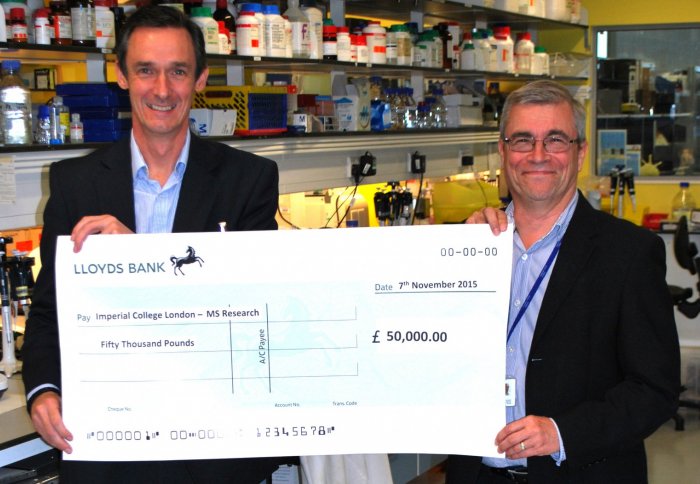£50,000 donation to advance multiple sclerosis (MS) research
by Daniel Mapp

Nigel Furmston with Professor Richard Reynolds
A fundraising campaign has raised £50,000 to provide essential research equipment for Professor Richard Reynolds' pioneering MS research.
Professor Reynolds last month spoke of the impact of philanthropy on research, as he accepted a cheque for £50,000 from Nigel Furmston, a longstanding supporter of multiple sclerosis (MS) research at Imperial College London.
Mr Furmston, whose wife Sharon has MS, raised the funds through two major events in 2015. A golf day and auction held in June generated £30,000, with a further £20,000 raised at a Grand Autumn Ball held in November at the Kings Chapel, Old Amersham, Buckinghamshire. Over the last six years, Mr Furmston has raised £94,000 in support of Professor Reynolds’ research.
The donation will be used to purchase a scanning fluorescence microscope which will enable researchers to capture images of large sections of brain tissue taken from people with MS, allowing them to study areas of tissue damage which have been “tagged” with fluorescence.
The cheque was presented during Mr Furmston’s visit to Imperial’s Hammersmith Campus, where he met some of those working in Professor Reynolds’ group and heard about recent progress in MS research.
Mr Furmston said: “I’m delighted to know that Richard and his team are making so many important scientific breakthroughs in MS research and I look forward to continuing my fundraising activities further to support their work”.
Professor Reynolds’ research is exploring the processes behind the progression of MS. By understanding these processes better, it may be possible to develop therapies that can slow or stop the progression of the disease, which is currently untreatable.
Professor Reynolds said: “Nigel’s continued support has made such a difference to our research, and I am hugely grateful for his extraordinary efforts this year. Donations like his allow us to go beyond what would be possible through conventional funding alone. His donation will be spent on an important piece of equipment that would otherwise have been difficult to acquire.”
Article text (excluding photos or graphics) © Imperial College London.
Photos and graphics subject to third party copyright used with permission or © Imperial College London.
Reporter
Daniel Mapp
Advancement